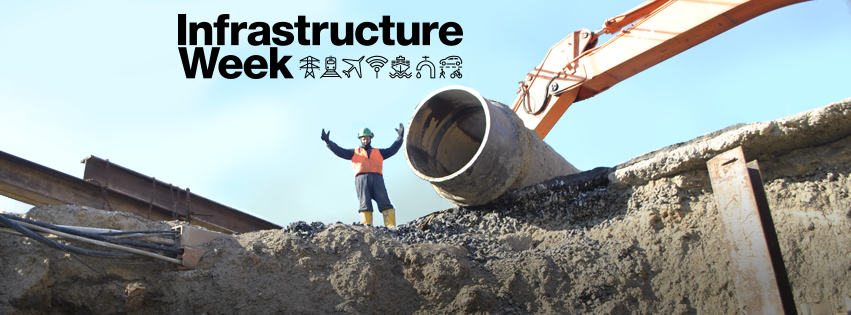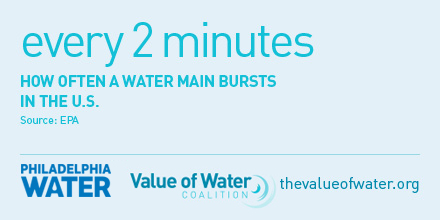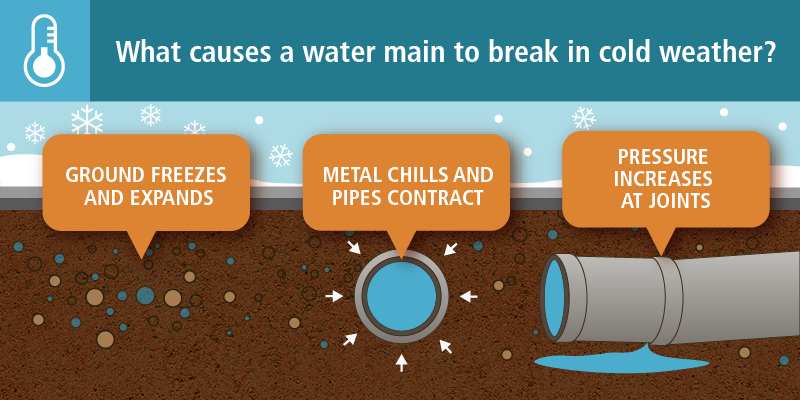
Philadelphia Water crews replace a main in the Graduate Hospital area. Credit: Philadelphia Water.
Today, we notified City Council and the City’s independent Water Rate Board that Philadelphia Water needs to request a rate increase that would go into effect on July 1, 2016.
The increase we proposed amounts to 11.7 percent over a two-year period, and would raise the typical residential bill $8 per month by 2018. The chart below breaks down the changes a typical residential customer would see:
We know that no one likes to hear about rates going up. We don’t ask for a rate change unless we need it, and we want to make sure our customers have the all the facts.
First, it’s important to understand that, unlike private utilities, we don’t make a profit. But we do need to raise enough money to provide essential water, sewer, and stormwater services, repair and upgrade our aging system, and meet new regulatory challenges. By meeting those challenges, we are investing more in protecting our most valuable resource—fresh, clean water— and avoiding heavy regulatory fines and fees.
Our water will also continue to be an incredible value at the tap. Even after the full implementation of the proposed increase, the price of our drinking water would remain less than one penny per gallon—135 times cheaper than bottled water.
Despite that value, we continue to experience decreasing revenue due to growing bottled water consumption and more efficient appliances and plumbing that use less water.
The fact is, we need your support to invest in making our city’s infrastructure better and to increase the value of our rivers as economic assets by making them cleaner, healthier, and more attractive to all.
Click here to see a detailed fact sheet about the rate request and to learn more about how you can submit comments or participate in public hearings. Below, we answer some of the big questions:
Q: Why might rates change?
A: There are a number of reasons, but one of the biggest factors is the need to replace dozens of miles of water mains and sewers each year.
Philadelphia has one of the oldest water systems in the country, with over 3,000 miles of water mains to maintain and replace. The city experienced 919 water main breaks between July 2014 and July 2015—the highest total since 1996. In January of last year, eight water mains broke in a single 24-hour period.
These breaks are not just inconvenient. In some cases, flooding has displaced residents from their homes for weeks, and multiple large breaks can cost the City millions of dollars per year in customer claims related to damaged homes and cars. This increase in main breaks is due, in part, to aging infrastructure. The average age of a water main in Philadelphia is about 70 years.
Click here to learn more about why we’re requesting an increase.
Q: How will the rate increase impact water bills?
A: A typical residential customer’s bill would increase from $67.43 to $71.59 after July, 2016 and to $75.51 after July, 2017. Our typical customer has a 5/8” water meter and uses 600 cubic feet of water (4,488 gallons) per month. Different water usage will result in higher or lower charges. Click here to see how the increase would impact seniors, small businesses and others.
Q: How do Philadelphia’s rates compare to other cities?
A: Philadelphia Water’s rates are competitive regionally and nationally. In some cases, our rates are nearly half of what other local private water providers charge. Nationally, our rates are in the same range as cities like Baltimore, and our water bills are significantly lower than those in Seattle, San Francisco and Washington D.C. Click here to see detailed local and national rate comparisons.
Q: What do I get from Philadelphia Water?
A: Our new rates come to about $2.40 per day for the average household using 150 gallons daily. That goes a long way, even if you just look at the potable water you get. Click here to see a detailed breakdown of how we invest funds collected from customer bills.
Q: What are you doing to keep costs as low as possible while replacing aging pipes?
A: Like all water and wastewater utilities, Philadelphia Water is challenged by rising costs in a number of areas. But we are undertaking measures to lower and manage expenses so we can keep costs as low possible while investing in infrastructure that keeps the city going and growing. Click here to see some of our efforts and programs.
Q: Are you making sure assistance is available for those who need it?
A: Yes. We provide many assistance programs to customers to help them maintain water service. Last year alone, Philadelphia Water and the Water Revenue Bureau contributed over $22 million in assistance to customers in need. Click here to learn more about those programs.
Q: What can I do to make my voice heard if I support or object to increasing funding for Philadelphia Water?
A: We have a new rate-setting process that ensures every customer can participate. This is the first rate change request that will be overseen by the Water Rate Board, an independent board that will review our request and hold public and technical hearings. Our rate request must be fact based and transparent, and we have to publically prove that it’s justified and reasonable. Click here to learn more and find out how you can get involved.
Do go directly to the Water Rate Board site, click here.
Contact the Water Rate Board:
Email: WaterRateBoard@phila.gov
Rate Board Address:
Philadelphia Water, Sewer and Storm Water Rate Board
City of Philadelphia Law Department
attn: Frances Beckley
1515 Arch Street, 17th Floor
Philadelphia PA 19102






